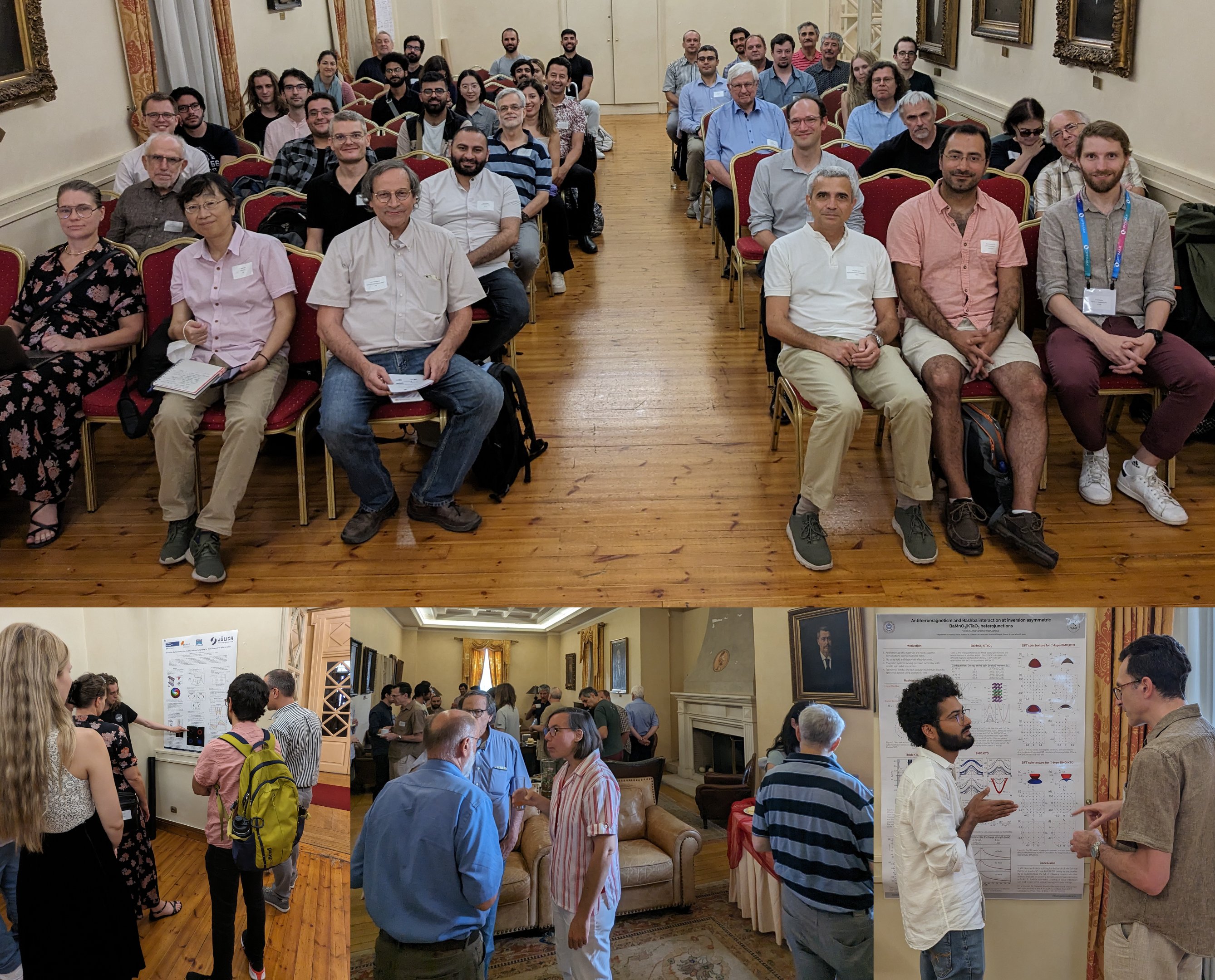First-principles Green function formalisms: algorithms, method developments and applications to spinorbitronics and magneto-superconductivity
4-7 of September 2023, Athens, Greece
The WE-Heraeus workshop entitled “First-principles Green function formalisms: algorithms, method developments and applications to spinorbitronics and magneto-superconductivity” took place from 4-7 of September in Athens, Greece. After years of only online meetings, the generous funding by the Psi-k charity and the WE-Heraeus Foundation made it possible to bring together the ab-initio Green function community in person. This workshop fostered networking opportunities and important personal exchange among different groups of method developers in the ab-initio Green function community. This was further stimulated by the complementary coffee breaks and lunches that were served in the rooms of the Kostis Palamas building of the National and Kapodistrian University of Athens where the entire workshop took place.
The 49 participants from 25 Institutions (13 countries from three continents) made the workshop a complete success. In a mix of invited talks, contributed talks, poster presentations and round table discussions, the workshop offered a forum for lively discussions and exchange of ideas in the community in the field of Green’s function based first-principles approaches to magnetism, spintronics and superconductivity. The workshop started with sessions of spinorbitronics and superconductivity and continued with presentations on ultrafast dynamics, methods beyond DFT and aspects of next generation exascale computing. Furthermore, talks on complex magnetism and the connection between superconductivity and magnetism were covered in several invited and contributed talks. Throughout the workshop the participants of this workshop discussed aspects of method development, high-performance computing algorithms and data science challenges. Moreover, timely research topics on magnetotransport properties, magnetization dynamics and complex magnetism sparked the scientific exchange. Finally, also the aspect of superconductivity and the connection of superconductivity and magnetism let to lively exchange. The workshop concluded with round table discussions where important aspects for the future like future computing architectures, the importance of machine learning, sustainable code development and a roadmap for the next Green function workshop was discussed.
Overall, the participants expressed their satisfaction with the workshop and greatly appreciated the possibility to meet their peers for in-depth exchange and networking within the world-wide ab-initio Green function community.
Organization Committee
- Philipp Rüßmann ([email protected]), University of Würzburg, Germany
- Manuel dos Santos Dias ([email protected]), STFC Daresbury Laboratory, United Kingdom
- Dr. Samir Lounis ([email protected]), Forschungszentrum Jülich and University of Duisburg-Essen, Germany
- Dr. Phivos Mavropoulos ([email protected]), National and Kapodistrian University of Athens, Greece
Detailed Program

A detailed booklet that includes the abstracts of the presentations is provided on the workshop’s website: https://go.fzj.de/gf2023-program
List of participants
| Name | Institution | Country |
| Nicholas Kioussis | California State University Northridge, | USA |
| Ondrej Sipr | FZU – Institute of Physics, | Czech Republic |
| Mark van Schilfgaarde | National Renewable Energy Laboratories, | USA |
| Kyungwha Park | Virginia Tech, | USA |
| Anna Delin | KTH, | Sweden |
| Hubert Ebert | Ludwig-Maximilians-University Munich, | Germany |
| Jürgen Henk | Martin Luther University Halle, | Germany |
| Franziska Ziolkowski | Martin Luther University Halle, | Germany |
| Jerome Jackson | STFC Daresbury Laboratory, | United Kingdom |
| Irene Aguilera | University of Amsterdam, | The Netherlands |
| Johannes Wasmer | Forschungszentrum Jülich, | Germany |
| Rudolf Zeller | Forschungszentrum Jülich, | Germany |
| Markus Eisenbach | National Center for Computational Sciences, | USA |
| Sergiy Mankovskyy | Ludwig-Maximilians-University of Munich, | Germany |
| Nihad AbuAwwad | Forschungszentrum Jülich, | Germany |
| Juba Bouaziz | Forschungszentrum Jülich, | Germany |
| Krisztian Palotas | Wigner Research Center for Physics, | Hungary |
| Kirill Belashchenko | University of Nebraska-Lincoln, | USA |
| Laszlo Szunyogh | Budapest University of Technology and Economics, | Hungary |
| Sebastian Paischer | Johannes Kepler University Linz, | Austria |
| Akash Bajaj | Trinity College Dublin, | Ireland |
| Antimo Marrazzo | University of Trieste, | Italy |
| Tom G. Saunderson | University of Mainz, | Germany |
| Balázs Ujfalussy | Wigner Research Centre for Physics, | Hungary |
| Uriel Aceves | Forschungszentrum Jülich & University of Duisburg-Essen, | Germany |
| Bendegúz Nyári | Budapest University of Technology and Economics, | Hungary |
| András Lászlóffy | Wigner Research Centre for Physics, | Hungary |
| Silke Biermann | Ecole Polytechnique, | France |
| Jan Minar | University of West Bohemia, | Czech Republic |
| David Antognini Silva | Forschungszentrum Jülich, | Germany |
| Masoumeh Davoudiniya | Uppsala University, | Sweden |
| David Eilmsteiner | Johannes Kepler University Linz, | Austria |
| Mohammad Hemmati | Forschungszentrum Jülich, | Germany |
| Ilias Klepetsanis | Forschungszentrum Jülich, | Germany |
| Adamantia Kosma | Forschungszentrum Jülich, | Germany |
| Nóra Kucska | Wigner Research Centre for Physics, | Hungary |
| Vivek Kumar | IISER Bhopal, | India |
| Leon Petit | STFC Daresbury Laboratory, | United Kingdom |
| Svitlana Polesya | Ludwig-Maximilians-University of Munich, | Germany |
| Selcuk Sözeri | University of Duisburg-Essen & CENIDE, | Germany |
| Sufyan Shehada | Forschungszentrum Jülich, | Germany |
| László Udvardi | Budapest University of Technology and Economics, | Hungary |
| Moritz Winterott | Forschungszentrum Jülich, | Germany |
| Hangyu Zhou | Forschungszentrum Jülich, | Germany |
| Stefan Blügel | Forschungszentrum Jülich, | Germany |
| Philipp Rüßmann | University of Würzburg &FZ Jülich, | Germany |
| Manuel dos Santos Dias | STFC Daresbury Laboratory, | United Kingdom |
| Samir Lounis | FZ Jülich, and University of Duisburg-Essen, | Germany |
| Phivos Mavropoulos | National and Kapodistrian University of Athens, | Greece |

